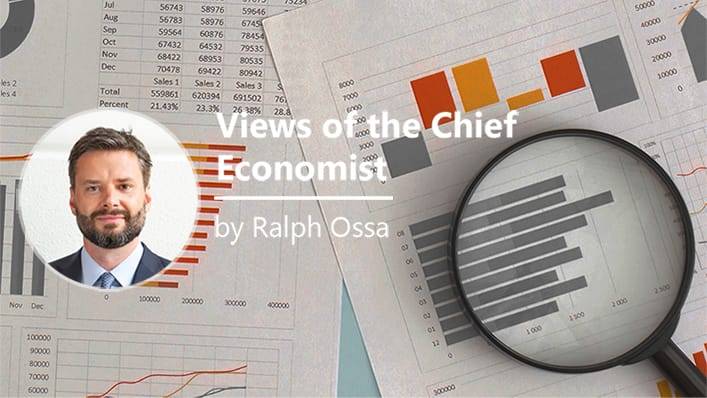Main Points In Hindi (मुख्य बातें – हिंदी में)
-
अंतर्राष्ट्रीय व्यापार और जलवायु परिवर्तन: अंतर्राष्ट्रीय व्यापार को जलवायु परिवर्तन के संदर्भ में अक्सर नकारात्मक रूप से देखा जाता है, लेकिन यह वास्तव में इस समस्या का समाधान करने में एक महत्वपूर्ण हिस्सा हो सकता है। यदि प्रभावी जलवायु नीतियां लागू की जाएं, तो अंतर्राष्ट्रीय व्यापार से पर्यावरणीय लाभ प्राप्त हो सकते हैं।
-
विशेषज्ञता और ग्रीनहाउस गैस उत्सर्जन में कमी: वैश्विक ग्रीनहाउस गैस उत्सर्जन में कमी तब होती है जब देश उन उद्योगों में विशेषज्ञता विकसित करते हैं जहां उनका उत्सर्जन तुलनात्मक रूप से कम होता है। यही कारण है कि अंतर्राष्ट्रीय व्यापार आर्थिक और पर्यावरणीय दोनों प्रकार के लाभों को उत्पन्न कर सकता है।
-
कार्बन टैक्स के प्रभाव: कार्बन टैक्स लागू करने से ग्रीनहाउस गैसों के उत्सर्जन में कमी होती है और इसका एक तिहाई हिस्सा व्यापार से प्राप्त पर्यावरणीय लाभों से आता है। यह दर्शाता है कि व्यापार जलवायु नीतियों के लिए एक शक्तिशाली गुणक का कार्य कर सकता है।
-
नीतियों का महत्व: जलवायु नीतियों का निर्माण करते समय उनके व्यापार सरोकारों को ध्यान में रखना आवश्यक है। व्यापार और जलवायु नीतियों को एक-दूसरे के साथ जोड़ना और सहयोग करना आवश्यक है।
- विकासशील देशों की भूमिका: विकासशील देशों के पास भी हरित ऊर्जा उत्पादन की पर्याप्त क्षमता है, जिससे उन्हें ऊर्जा-गहन उत्पादन में हरित तुलनात्मक लाभ विकसित करने का अवसर मिलता है। इस प्रकार, व्यापार और विकास के प्रयास मिलकर सतत विकास को बढ़ावा दे सकते हैं।
Main Points In English(मुख्य बातें – अंग्रेज़ी में)
Here are the main points from the text provided:
-
Perception of International Trade: International trade is often viewed negatively when discussing climate change, as it is linked to transportation emissions from trucks, airplanes, and cargo ships. This leads to a preference for local buying as a ‘greener’ choice, which can restrict international trade in the name of environmental protection.
-
Potential of International Trade: Contrary to popular belief, international trade can be a powerful part of the solution to climate change, especially when effective climate policies are implemented. Research indicates that countries can achieve lower greenhouse gas emissions by specializing in industries where their emissions are relatively low.
-
Carbon Tax and its Impact: Implementing a global carbon tax can significantly reduce greenhouse gas emissions. The paper suggests that a substantial portion of emission reductions (over one-third) resulting from carbon taxes can be attributed to environmental benefits from trade, making trade a crucial multiplier for climate policies.
-
Trade Policy Considerations: Climate policies should consider their implications for trade. Rather than viewing trade as a necessary cost for combating climate change, it should be seen as an essential ally that enhances the effectiveness of climate initiatives.
- Inclusive Opportunities for Developing Economies: The findings suggest that environmental benefits from trade are not limited to advanced economies. Many developing countries have the potential for significant green energy production, presenting opportunities for sustainable development through energy-efficient production practices, thereby promoting a more inclusive perspective on development and sustainability.


Complete News In Hindi(पूरी खबर – हिंदी में)
जब जलवायु परिवर्तन की बात आती है तो अंतर्राष्ट्रीय व्यापार को अक्सर संदेह की दृष्टि से देखा जाता है। बहुत से लोग व्यापार को परिवहन से जोड़ते हैं, और परिवहन को ट्रकों, विमानों या मालवाहक जहाजों से होने वाले उत्सर्जन से जोड़ते हैं। परिणामस्वरूप, हरे रंग की खरीदारी को अक्सर स्थानीय खरीद के बराबर माना जाता है, जिससे ग्रह की रक्षा के नाम पर अंतर्राष्ट्रीय व्यापार को सीमित करने की मांग की जाती है।
यह कथा, सहज ज्ञान युक्त होते हुए भी, मौलिक रूप से त्रुटिपूर्ण है। अंतर्राष्ट्रीय व्यापार, वास्तव में, जलवायु परिवर्तन की समस्या के समाधान का एक शक्तिशाली हिस्सा हो सकता है – यदि प्रभावी जलवायु नीतियां लागू हों। हाल ही में जारी डब्ल्यूटीओ स्टाफ वर्किंग पेपर में हमने यही बात कही है, जो डब्ल्यूटीओ में शामिल होने से पहले ज्यूरिख विश्वविद्यालय में मेरे द्वारा किए गए शोध पर आधारित है।
मुख्य तर्क सीधा है: वैश्विक ग्रीनहाउस गैस उत्सर्जन में गिरावट आती है जब अर्थव्यवस्थाएं उन उद्योगों में विशेषज्ञ होती हैं जहां उनका उत्सर्जन अपेक्षाकृत कम होता है, ठीक उसी तरह जब अर्थव्यवस्थाएं उन उद्योगों में विशेषज्ञ होती हैं जहां उनकी उत्पादकता अपेक्षाकृत अधिक होती है तो वैश्विक वास्तविक आय बढ़ती है। अलग ढंग से कहें तो, जब अर्थव्यवस्थाएं अपने पर्यावरणीय तुलनात्मक लाभ के आधार पर विशेषज्ञता हासिल करती हैं, तो व्यापार से पर्यावरणीय लाभ होते हैं, ठीक उसी तरह जब अर्थव्यवस्थाएं अपने आर्थिक तुलनात्मक लाभ के आधार पर विशेषज्ञता हासिल करती हैं, तो व्यापार से आर्थिक लाभ होता है।
इन दो प्रकार के लाभों के बीच महत्वपूर्ण अंतर यह है कि आर्थिक लाभ स्वाभाविक रूप से, बाजार की ताकतों के परिणामस्वरूप होते हैं, जबकि पर्यावरणीय लाभों को मूर्त रूप देने के लिए सहायक जलवायु नीतियों की आवश्यकता होती है। पाठ्यपुस्तक का उदाहरण एक वैश्विक कार्बन टैक्स होगा, जो उत्सर्जित CO2 के प्रति टन के लिए भुगतान की जाने वाली कीमत है, जो फर्मों और परिवारों को उनके उत्पादन और उपभोग विकल्पों के पर्यावरणीय प्रभाव को आंतरिक करने में मदद करता है।
वर्किंग पेपर में, हम वैश्विक कार्बन टैक्स शुरू करने के प्रभावों का अनुकरण करते हैं। हमारे बेंचमार्क परिदृश्य में सभी अर्थव्यवस्थाओं में सभी वस्तुओं पर प्रति टन CO2 समकक्ष (tCO2eq) 100 अमेरिकी डॉलर का एक समान कार्बन कर लगाने की सुविधा है। फिर भी, हमारा मुख्य निष्कर्ष कार्बन कर दरों और कवरेज की एक विस्तृत श्रृंखला पर आधारित है। मुख्य परिणाम यह है कि कार्बन टैक्स द्वारा ग्रीनहाउस गैस उत्सर्जन में आई कुल कमी का एक तिहाई से अधिक व्यापार से पर्यावरणीय लाभ से उत्पन्न होता है। दूसरे शब्दों में, व्यापार जलवायु नीतियों के लिए एक शक्तिशाली शक्ति गुणक के रूप में कार्य करता है।
व्यापार से पर्यावरणीय लाभ को इंगित करने के लिए, हम कार्बन टैक्स द्वारा लाए गए ग्रीनहाउस गैस उत्सर्जन में कटौती को तीन प्रभावों में विघटित करते हैं। सबसे पहले, कर पूरे बोर्ड में लागत बढ़ाता है, जिससे समग्र आर्थिक गतिविधि (पैमाने पर प्रभाव) में कमी आती है। दूसरा, कर कार्बन-सघन क्षेत्रों से वस्तुओं की सापेक्ष कीमतें बढ़ाता है, जिससे आर्थिक गतिविधियों में हरित क्षेत्रों (संरचना प्रभाव) की ओर बदलाव होता है। और तीसरा, कर उच्च उत्सर्जन वाली अर्थव्यवस्थाओं से माल को अपेक्षाकृत अधिक महंगा बनाता है, जिसके परिणामस्वरूप आर्थिक गतिविधि हरित अर्थव्यवस्थाओं (हरित सोर्सिंग प्रभाव) की ओर स्थानांतरित हो जाती है। जबकि पैमाने और संरचना प्रभाव एक बंद अर्थव्यवस्था में भी होते हैं जो अंतर्राष्ट्रीय व्यापार में भाग नहीं लेते हैं, ग्रीन सोर्सिंग प्रभाव उस लाभ का लाभ उठाता है जो केवल अंतर्राष्ट्रीय व्यापार के साथ उपलब्ध होता है, जिससे व्यापार से पर्यावरणीय लाभ प्राप्त होता है (चित्र 1 देखें)।
मुख्य नीतिगत उपाय यह है कि जलवायु नीतियों को उनके व्यापार निहितार्थों को ध्यान में रखकर तैयार किया जाना चाहिए। यह मानना आकर्षक हो सकता है कि व्यापार प्रणाली को कुछ अतिरिक्त क्षति जलवायु परिवर्तन के खिलाफ लड़ाई में एक स्वीकार्य लागत है। हालाँकि, यह एक महत्वपूर्ण तथ्य को नजरअंदाज करता है: जलवायु नीतियों को पूरी तरह से प्रभावी बनाने के लिए खुला व्यापार आवश्यक है। दोनों को साथ मिलकर काम करना चाहिए।
क्या इसका मतलब यह है कि परिवहन उत्सर्जन महत्वपूर्ण नहीं है? बिल्कुल नहीं। निस्संदेह, परिवहन क्षेत्र को डीकार्बोनाइज़ करना महत्वपूर्ण है। हालाँकि, परिवहन उत्सर्जन समग्र उत्सर्जन का एक छोटा सा हिस्सा दर्शाता है, और विभिन्न अर्थव्यवस्थाओं में उत्पादन उत्सर्जन में काफी भिन्नता है। परिणामस्वरूप, यदि विदेश में कम उत्पादन उत्सर्जन, उच्च परिवहन उत्सर्जन की तुलना में अधिक हो, तो आयात करना हरित विकल्प हो सकता है। पर्यावरणीय तुलनात्मक लाभ के अनुसार विशेषज्ञता वैश्विक अर्थव्यवस्था के लिए इस हरित सोर्सिंग दृष्टिकोण को प्रभावी ढंग से मापती है।
क्या इसका मतलब यह है कि व्यापार से पर्यावरणीय लाभ मुख्य रूप से उन्नत अर्थव्यवस्थाओं को लाभ पहुंचाते हैं जिन्होंने पहले से ही डीकार्बोनाइजिंग में पर्याप्त प्रगति की है? से बहुत दूर। कई विकासशील अर्थव्यवस्थाएँ प्रचुर धूप या तेज़ हवाओं वाले क्षेत्रों में स्थित हैं, जिसका अर्थ है कि उनमें महत्वपूर्ण मात्रा में हरित ऊर्जा उत्पन्न करने की क्षमता है। यह इन अर्थव्यवस्थाओं के लिए ऊर्जा-गहन उत्पादन में हरित तुलनात्मक लाभ विकसित करने का अवसर प्रस्तुत करता है। इसलिए, हमारे निष्कर्ष सतत विकास पर अधिक समावेशी परिप्रेक्ष्य की ओर इशारा करते हैं, जिसमें इस बात पर प्रकाश डाला गया है कि व्यापार, विकास और स्थिरता प्रयास एक दूसरे के पूरक कैसे हो सकते हैं।
Complete News In English(पूरी खबर – अंग्रेज़ी में)
When it comes to climate change, international trade is often viewed skeptically. Many people associate trade with transportation, and they link transportation to the emissions produced by trucks, planes, and cargo ships. As a result, green shopping is frequently equated with buying local, leading to calls for limiting international trade in the name of protecting the planet.
This belief, while intuitive, is fundamentally flawed. In reality, international trade can be a powerful part of the solution to climate change, especially if effective climate policies are in place. This is what we argued in a recently released WTO staff working paper, based on my research at the University of Zurich before joining the WTO.
The main argument is straightforward: global greenhouse gas emissions decrease when economies specialize in industries where their emissions are relatively low. Similarly, when economies specialize in industries where their productivity is relatively high, global real income increases. In other words, when economies develop expertise based on their environmental comparative advantages, trade can yield environmental benefits; just as trade can yield economic benefits when based on their economic comparative advantages.
The key difference between these two types of benefits is that economic gains occur naturally due to market forces, while environmental benefits require supportive climate policies to materialize. A textbook example is a global carbon tax, which charges companies and households for every ton of CO2 emitted, helping them to consider the environmental impact of their production and consumption choices.
In our working paper, we model the impacts of implementing a global carbon tax. In our benchmark scenario, we proposed a uniform carbon tax of $100 per ton of CO2 equivalent (tCO2eq) on all goods across all economies. However, our main conclusion is based on a broad range of carbon tax rates and coverage. The primary finding is that more than one-third of the total reduction in greenhouse gas emissions from a carbon tax comes from environmental benefits of trade. In other words, trade acts as a powerful multiplier for climate policies.
To highlight the environmental benefits of trade, we break down the reductions in greenhouse gas emissions achieved through a carbon tax into three effects. First, the tax raises costs across the board, which reduces overall economic activity (scale effect). Second, the tax increases the relative prices of goods in carbon-intensive sectors, shifting economic activities toward greener sectors (structural effect). Third, the tax makes goods from high-emission economies relatively more expensive, resulting in economic activity shifting toward greener economies (green sourcing effect). While scale and structural effects also occur in a closed economy that does not engage in international trade, the green sourcing effect leverages the advantages that are only available through international trade, leading to environmental benefits from trade (see Figure 1).
The key policy takeaway is that climate policies should be designed with their trade implications in mind. It may be tempting to think that some damage to the trading system is an acceptable cost in the fight against climate change. However, this overlooks a crucial fact: open trade is essential for making climate policies fully effective. Both need to work together.
Does this mean that transportation emissions are not important? Absolutely not. It is indeed crucial to decarbonize the transportation sector. However, transportation emissions represent a small part of overall emissions, and there is significant variation in production emissions across different economies. As a result, importing may be a greener option if overseas production has lower emissions, even if transport emissions are higher. Specialization based on environmental comparative advantages effectively measures this green sourcing approach for the global economy.
Does this mean that the environmental benefits of trade mainly benefit advanced economies that have already made significant progress in decarbonization? Far from it. Many developing economies are located in areas with ample sunlight or strong winds, meaning they have great potential for generating significant amounts of green energy. This presents an opportunity for these economies to develop a green comparative advantage in energy-intensive production. Therefore, our findings point towards a more inclusive perspective on sustainable development, highlighting how trade, development, and sustainability efforts can complement each other.
The text has been simplified to provide a clearer understanding while retaining its original meaning and key points.










